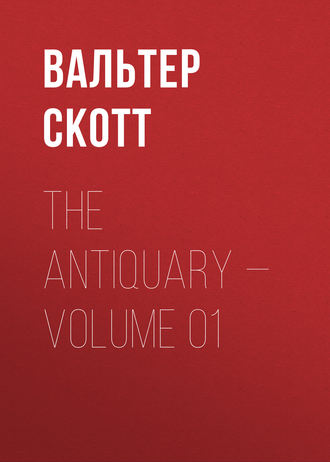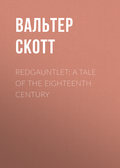
Вальтер Скотт
The Antiquary — Volume 01
"What is the matter?" inquired Miss Oldbuck and Miss M'Intyre.
"The tide! — the tide!" answered the alarmed Antiquary.
"Had not Jenny better — but no, I'll run myself," said the younger lady, partaking in all her uncle's terrors — "I'll run myself to Saunders Mucklebackit, and make him get out his boat."
"Thank you, my dear, that's the wisest word that has been spoken yet — Run! run! — To go by the sands!" seizing his hat and cane; "was there ever such madness heard of!"
CHAPTER SEVENTH
— Pleased awhile to view
The watery waste, the prospect wild and new;
The now receding waters gave them space,
On either side, the growing shores to trace
And then returning, they contract the scene,
Till small and smaller grows the walk between.
Crabbe.
The information of Davie Dibble, which had spread such general alarm at Monkbarns, proved to be strictly correct. Sir Arthur and his daughter had set out, according to their first proposal, to return to Knockwinnock by the turnpike road; but when they reached the head of the loaning, as it was called, or great lane, which on one side made a sort of avenue to the house of Monkbarns, they discerned, a little way before them, Lovel, who seemed to linger on the way as if to give him an opportunity to join them. Miss Wardour immediately proposed to her father that they should take another direction; and, as the weather was fine, walk home by the sands, which, stretching below a picturesque ridge of rocks, afforded at almost all times a pleasanter passage between Knockwinnock and Monkbarns than the high-road.
Sir Arthur acquiesced willingly. "It would be unpleasant," he said, "to be joined by that young fellow, whom Mr. Oldbuck had taken the freedom to introduce them to." And his old-fashioned politeness had none of the ease of the present day which permits you, if you have a mind, to cut the person you have associated with for a week, the instant you feel or suppose yourself in a situation which makes it disagreeable to own him. Sir Arthur only stipulated, that a little ragged boy, for the guerdon of one penny sterling, should run to meet his coachman, and turn his equipage back to Knockwinnock.
When this was arranged, and the emissary despatched, the knight and his daughter left the high-road, and following a wandering path among sandy hillocks, partly grown over with furze and the long grass called bent, soon attained the side of the ocean. The tide was by no means so far out as they had computed but this gave them no alarm; — there were seldom ten days in the year when it approached so near the cliffs as not to leave a dry passage. But, nevertheless, at periods of spring-tide, or even when the ordinary flood was accelerated by high winds, this road was altogether covered by the sea; and tradition had recorded several fatal accidents which had happened on such occasions. Still, such dangers were considered as remote and improbable; and rather served, with other legends, to amuse the hamlet fireside, than to prevent any one from going between Knockwinnock and Monkbarns by the sands.
As Sir Arthur and Miss Wardour paced along, enjoying the pleasant footing afforded by the cool moist hard sand, Miss Wardour could not help observing that the last tide had risen considerably above the usual water-mark. Sir Arthur made the same observation, but without its occurring to either of them to be alarmed at the circumstance. The sun was now resting his huge disk upon the edge of the level ocean, and gilded the accumulation of towering clouds through which he had travelled the livelong day, and which now assembled on all sides, like misfortunes and disasters around a sinking empire and falling monarch. Still, however, his dying splendour gave a sombre magnificence to the massive congregation of vapours, forming out of their unsubstantial gloom the show of pyramids and towers, some touched with gold, some with purple, some with a hue of deep and dark red. The distant sea, stretched beneath this varied and gorgeous canopy, lay almost portentously still, reflecting back the dazzling and level beams of the descending luminary, and the splendid colouring of the clouds amidst which he was setting. Nearer to the beach the tide rippled onward in waves of sparkling silver, that imperceptibly, yet rapidly, gained upon the sand.
With a mind employed in admiration of the romantic scene, or perhaps on some more agitating topic, Miss Wardour advanced in silence by her father's side, whose recently offended dignity did not stoop to open any conversation. Following the windings of the beach, they passed one projecting point of headland or rock after another, and now found themselves under a huge and continued extent of the precipices by which that iron-bound coast is in most places defended. Long projecting reefs of rock, extending under water and only evincing their existence by here and there a peak entirely bare, or by the breakers which foamed over those that were partially covered, rendered Knockwinnock bay dreaded by pilots and ship-masters. The crags which rose between the beach and the mainland, to the height of two or three hundred feet, afforded in their crevices shelter for unnumbered sea-fowl, in situations seemingly secured by their dizzy height from the rapacity of man. Many of these wild tribes, with the instinct which sends them to seek the land before a storm arises, were now winging towards their nests with the shrill and dissonant clang which announces disquietude and fear. The disk of the sun became almost totally obscured ere he had altogether sunk below the horizon, and an early and lurid shade of darkness blotted the serene twilight of a summer evening. The wind began next to arise; but its wild and moaning sound was heard for some time, and its effects became visible on the bosom of the sea, before the gale was felt on shore. The mass of waters, now dark and threatening, began to lift itself in larger ridges, and sink in deeper furrows, forming waves that rose high in foam upon the breakers, or burst upon the beach with a sound resembling distant thunder.
Appalled by this sudden change of weather, Miss Wardour drew close to her father, and held his arm fast. "I wish," at length she said, but almost in a whisper, as if ashamed to express her increasing apprehensions, "I wish we had kept the road we intended, or waited at Monkbarns for the carriage."
Sir Arthur looked round, but did not see, or would not acknowledge, any signs of an immediate storm. They would reach Knockwinnock, he said, long before the tempest began. But the speed with which he walked, and with which Isabella could hardly keep pace, indicated a feeling that some exertion was necessary to accomplish his consolatory prediction.
They were now near the centre of a deep but narrow bay or recess, formed by two projecting capes of high and inaccessible rock, which shot out into the sea like the horns of a crescent; — and neither durst communicate the apprehension which each began to entertain, that, from the unusually rapid advance of the tide, they might be deprived of the power of proceeding by doubling the promontory which lay before them, or of retreating by the road which brought them thither.
As they thus pressed forward, longing doubtless to exchange the easy curving line, which the sinuosities of the bay compelled them to adopt, for a straighter and more expeditious path, Sir Arthur observed a human figure on the beach advancing to meet them. "Thank God," he exclaimed, "we shall get round Halket-head! — that person must have passed it;" thus giving vent to the feeling of hope, though he had suppressed that of apprehension.
"Thank God, indeed!" echoed his daughter, half audibly, half internally, as expressing the gratitude which she strongly felt.
The figure which advanced to meet them made many signs, which the haze of the atmosphere, now disturbed by wind and by a drizzling rain, prevented them from seeing or comprehending distinctly. — Some time before they met, Sir Arthur could recognise the old blue-gowned beggar, Edie Ochiltree. It is said that even the brute creation lay aside their animosities and antipathies when pressed by an instant and common danger. The beach under Halket-head, rapidly diminishing in extent by the encroachments of a spring-tide and a north-west wind, was in like manner a neutral field, where even a justice of peace and a strolling mendicant might meet upon terms of mutual forbearance.
"Turn back! turn back!" exclaimed the vagrant; "why did ye not turn when I waved to you?"
"We thought," replied Sir Arthur, in great agitation, "we thought we could get round Halket-head."
"Halket-head! — the tide will be running on Halket-head by this time like the Fall of Fyers! — it was a' I could do to get round it twenty minutes since — it was coming in three feet abreast. We will maybe get back by Bally-burgh Ness Point yet. The Lord help us! — it's our only chance. We can but try."
"My God, my child!" — "My father! my dear father!" exclaimed the parent and daughter, as, fear lending them strength and speed, they turned to retrace their steps, and endeavoured to double the point, the projection of which formed the southern extremity of the bay.
"I heard ye were here frae the bit callant ye sent to meet your carriage," said the beggar, as he trudged stoutly on a step or two behind Miss Wardour; "and I couldna bide to think o' the dainty young leddy's peril, that has aye been kind to ilka forlorn heart that cam near her. Sae I lookit at the lift and the rin o' the tide, till I settled it that if I could get down time eneugh to gie you warning, we wad do weel yet. But I doubt, I doubt, I have been beguiled! for what mortal ee ever saw sic a race as the tide is risening e'en now? See, yonder's the Ratton's Skerry — he aye held his neb abune the water in my day — but he's aneath it now."
Sir Arthur cast a look in the direction in which the old man pointed. A huge rock, which in general, even in spring-tides, displayed a hulk like the keel of a large vessel, was now quite under water, and its place only indicated by the boiling and breaking of the eddying waves which encountered its submarine resistance.
"Mak haste, mak haste, my bonny leddy," continued the old man — "mak haste, and we may do yet! Take haud o' my arm — an auld and frail arm it's now, but it's been in as sair stress as this is yet. Take haud o' my arm, my winsome leddy! D'ye see yon wee black speck amang the wallowing waves yonder? This morning it was as high as the mast o' a brig — it's sma' eneugh now — but, while I see as muckle black about it as the crown o' my hat, I winna believe but we'll get round the Ballyburgh Ness, for a' that's come and gane yet."
Isabella, in silence, accepted from the old man the assistance which Sir Arthur was less able to afford her. The waves had now encroached so much upon the beach, that the firm and smooth footing which they had hitherto had on the sand must be exchanged for a rougher path close to the foot of the precipice, and in some places even raised upon its lower ledges. It would have been utterly impossible for Sir Arthur Wardour, or his daughter, to have found their way along these shelves without the guidance and encouragement of the beggar, who had been there before in high tides, though never, he acknowledged, "in sae awsome a night as this."
It was indeed a dreadful evening. The howling of the storm mingled with the shrieks of the sea-fowl, and sounded like the dirge of the three devoted beings, who, pent between two of the most magnificent, yet most dreadful objects of nature — a raging tide and an insurmountable precipice — toiled along their painful and dangerous path, often lashed by the spray of some giant billow, which threw itself higher on the beach than those that had preceded it. Each minute did their enemy gain ground perceptibly upon them! Still, however, loth to relinquish the last hopes of life, they bent their eyes on the black rock pointed out by Ochiltree. It was yet distinctly visible among the breakers, and continued to be so, until they came to a turn in their precarious path, where an intervening projection of rock hid it from their sight. Deprived of the view of the beacon on which they had relied, they now experienced the double agony of terror and suspense. They struggled forward, however; but, when they arrived at the point from which they ought to have seen the crag, it was no longer visible: the signal of safety was lost among a thousand white breakers, which, dashing upon the point of the promontory, rose in prodigious sheets of snowy foam, as high as the mast of a first-rate man-of-war, against the dark brow of the precipice.
The countenance of the old man fell. Isabella gave a faint shriek, and, "God have mercy upon us!" which her guide solemnly uttered, was piteously echoed by Sir Arthur — "My child! my child! — to die such a death!"
"My father! my dear father!" his daughter exclaimed, clinging to him — "and you too, who have lost your own life in endeavouring to save ours!"
"That's not worth the counting," said the old man. "I hae lived to be weary o' life; and here or yonder — at the back o' a dyke, in a wreath o' snaw, or in the wame o' a wave, what signifies how the auld gaberlunzie dies?"
"Good man," said Sir Arthur, "can you think of nothing? — of no help? — I'll make you rich — I'll give you a farm — I'll" —
"Our riches will be soon equal," said the beggar, looking out upon the strife of the waters — "they are sae already; for I hae nae land, and you would give your fair bounds and barony for a square yard of rock that would be dry for twal hours."
While they exchanged these words, they paused upon the highest ledge of rock to which they could attain; for it seemed that any further attempt to move forward could only serve to anticipate their fate. Here, then, they were to await the sure though slow progress of the raging element, something in the situation of the martyrs of the early church, who, exposed by heathen tyrants to be slain by wild beasts, were compelled for a time to witness the impatience and rage by which the animals were agitated, while awaiting the signal for undoing their grates, and letting them loose upon the victims.
Yet even this fearful pause gave Isabella time to collect the powers of a mind naturally strong and courageous, and which rallied itself at this terrible juncture. "Must we yield life," she said, "without a struggle? Is there no path, however dreadful, by which we could climb the crag, or at least attain some height above the tide, where we could remain till morning, or till help comes? They must be aware of our situation, and will raise the country to relieve us."
Sir Arthur, who heard, but scarcely comprehended, his daughter's question, turned, nevertheless, instinctively and eagerly to the old man, as if their lives were in his gift. Ochiltree paused — "I was a bauld craigsman," he said, "ance in my life, and mony a kittywake's and lungie's nest hae I harried up amang thae very black rocks; but it's lang, lang syne, and nae mortal could speel them without a rope — and if I had ane, my ee-sight, and my footstep, and my hand-grip, hae a' failed mony a day sinsyne — And then, how could I save you? But there was a path here ance, though maybe, if we could see it, ye would rather bide where we are — His name be praised!" he ejaculated suddenly, "there's ane coming down the crag e'en now!" — Then, exalting his voice, he hilloa'd out to the daring adventurer such instructions as his former practice, and the remembrance of local circumstances, suddenly forced upon his mind: — "Ye're right! — ye're right! — that gate — that gate! — fasten the rope weel round Crummies-horn, that's the muckle black stane — cast twa plies round it — that's it! — now, weize yoursell a wee easel-ward — a wee mair yet to that ither stane — we ca'd it the Cat's-lug — there used to be the root o' an aik tree there — that will do! — canny now, lad — canny now — tak tent and tak time — Lord bless ye, tak time — Vera weel! — Now ye maun get to Bessy's apron, that's the muckle braid flat blue stane — and then, I think, wi' your help and the tow thegither, I'll win at ye, and then we'll be able to get up the young leddy and Sir Arthur."
The adventurer, following the directions of old Edie, flung him down the end of the rope, which he secured around Miss Wardour, wrapping her previously in his own blue gown, to preserve her as much as possible from injury. Then, availing himself of the rope, which was made fast at the other end, he began to ascend the face of the crag — a most precarious and dizzy undertaking, which, however, after one or two perilous escapes, placed him safe on the broad flat stone beside our friend Lovel. Their joint strength was able to raise Isabella to the place of safety which they had attained. Lovel then descended in order to assist Sir Arthur, around whom he adjusted the rope; and again mounting to their place of refuge, with the assistance of old Ochiltree, and such aid as Sir Arthur himself could afford, he raised himself beyond the reach of the billows.
The sense of reprieve from approaching and apparently inevitable death, had its usual effect. The father and daughter threw themselves into each other's arms, kissed and wept for joy, although their escape was connected with the prospect of passing a tempestuous night upon a precipitous ledge of rock, which scarce afforded footing for the four shivering beings, who now, like the sea-fowl around them, clung there in hopes of some shelter from the devouring element which raged beneath. The spray of the billows, which attained in fearful succession the foot of the precipice, overflowing the beach on which they so lately stood, flew as high as their place of temporary refuge; and the stunning sound with which they dashed against the rocks beneath, seemed as if they still demanded the fugitives in accents of thunder as their destined prey. It was a summer night, doubtless; yet the probability was slender, that a frame so delicate as that of Miss Wardour should survive till morning the drenching of the spray; and the dashing of the rain, which now burst in full violence, accompanied with deep and heavy gusts of wind, added to the constrained and perilous circumstances of their situation.
"The lassie! — the puir sweet, lassie!" said the old man: "mony such a night have I weathered at hame and abroad, but, God guide us, how can she ever win through it!"
His apprehension was communicated in smothered accents to Lovel; for with the sort of freemasonry by which bold and ready spirits correspond in moments of danger, and become almost instinctively known to each other, they had established a mutual confidence. — "I'll climb up the cliff again," said Lovel — there's daylight enough left to see my footing; I'll climb up, and call for more assistance."
"Do so, do so, for Heaven's sake!" said Sir Arthur eagerly.
"Are ye mad?" said the mendicant: "Francie o' Fowlsheugh, and he was the best craigsman that ever speel'd heugh (mair by token, he brake his neck upon the Dunbuy of Slaines), wodna hae ventured upon the Halket-head craigs after sun-down — It's God's grace, and a great wonder besides, that ye are not in the middle o' that roaring sea wi' what ye hae done already — I didna think there was the man left alive would hae come down the craigs as ye did. I question an I could hae done it mysell, at this hoar and in this weather, in the youngest and yaldest of my strength — But to venture up again — it's a mere and a clear tempting o' Providence,"
"I have no fear," answered Lovel; "I marked all the stations perfectly as I came down, and there is still light enough left to see them quite well — I am sure I can do it with perfect safety. Stay here, my good friend, by Sir Arthur and the young lady."
"Dell be in my feet then," answered the bedesman sturdily; "if ye gang, I'll gang too; for between the twa o' us, we'll hae mair than wark eneugh to get to the tap o' the heugh."
"No, no — stay you here and attend to Miss Wardour — you see Sir Arthur is quite exhausted."
"Stay yoursell then, and I'll gae," said the old man; — "let death spare the green corn and take the ripe."
"Stay both of you, I charge you," said Isabella, faintly; "I am well, and can spend the night very well here — I feel quite refreshed." So saying, her voice failed her — she sunk down, and would have fallen from the crag, had she not been supported by Lovel and Ochiltree, who placed her in a posture half sitting, half reclining, beside her father, who, exhausted by fatigue of body and mind so extreme and unusual, had already sat down on a stone in a sort of stupor.
"It is impossible to leave them," said Lovel — "What is to be done? — Hark! hark! — did I not hear a halloo?"
"The skreigh of a Tammie Norie," answered Ochiltree — "I ken the skirl weel."
"No, by Heaven!" replied Lovel, "it was a human voice."
A distant hail was repeated, the sound plainly distinguishable among the various elemental noises, and the clang of the sea-mews by which they were surrounded. The mendicant and Lovel exerted their voices in a loud halloo, the former waving Miss Wardour's handkerchief on the end of his staff to make them conspicuous from above. Though the shouts were repeated, it was some time before they were in exact response to their own, leaving the unfortunate sufferers uncertain whether, in the darkening twilight and increasing storm, they had made the persons who apparently were traversing the verge of the precipice to bring them assistance, sensible of the place in which they had found refuge. At length their halloo was regularly and distinctly answered, and their courage confirmed, by the assurance that they were within hearing, if not within reach, of friendly assistance.







